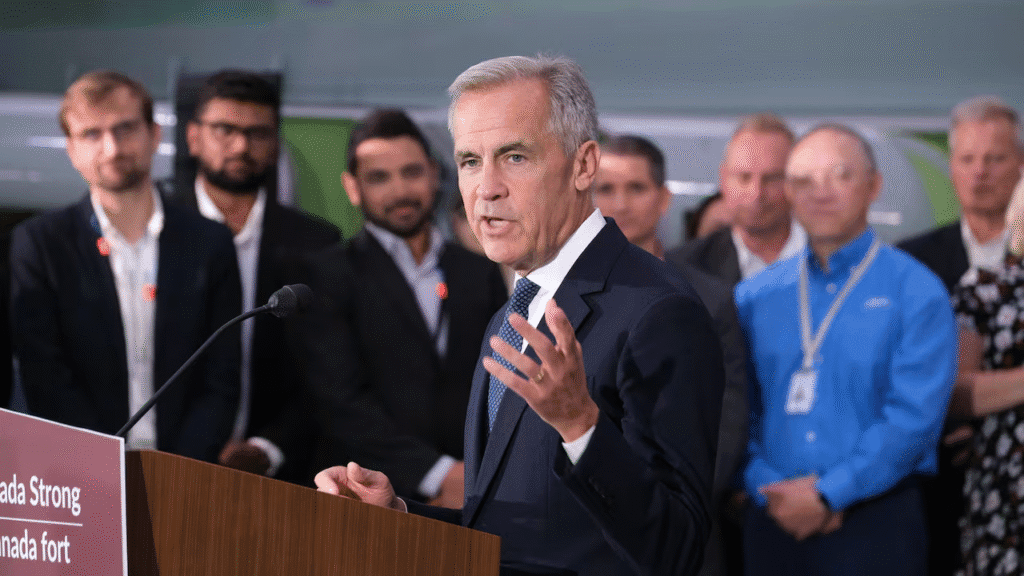
A major trade fight is happening between Canada and the United States (Carney-Trump). This fight is called the “Carney-Trump Tariff Showdown.” It is a clash between two powerful leaders. One is Canadian Prime Minister Mark Carney. The other is U.S. President Donald Trump. This battle over taxes on goods is very important. It affects jobs, factories, and prices for millions of people.
The relationship between these two neighbors is usually strong. They share the world’s longest undefended border. Their economies are closely linked. But now, new tariffs are causing trouble. This article will explain what started this crisis. It will also look at the high stakes for the North American economy.

The Spark: Digital Taxes and Dairy Tariffs
The trade crisis has two main causes. First, Canada decided to tax large American tech companies. This is called the Digital Services Tax, or DST. Canada felt that big companies like Google and Amazon should pay more. This tax is 3% on certain revenue. The U.S. President saw this as an attack on American business. He promised to hit back quickly.
Second, the U.S. has old complaints about Canadian trade. One long-standing issue is dairy products. Canada has very high tariffs on U.S. dairy. These taxes can be as high as 400%. This makes it hard for American farmers to sell milk and cheese in Canada. President Trump used both the new DST and the old dairy issue to justify new trade action.
The Tariff Escalation Begins
President Trump started the showdown in early 2025. He signed orders to put new tariffs on Canadian goods. A tariff is a tax on imports. At first, the tax was 25% on many Canadian products. Energy products faced a 10% tax. Later, this general tariff was increased to 35% on goods not covered by the main trade agreement.
Canada fought back right away. Prime Minister Carney put his own retaliatory tariffs on American goods. This is a common trade tactic. Canada put a 25% surtax on many U.S. products. This started a trade war. Both sides were now taxing each other’s goods.
The Core Trade Agreement: CUSMA
Most trade between Canada and the U.S. is still safe. This is because of the main trade deal. It is called the Canada-United States-Mexico Agreement (CUSMA). This deal replaced NAFTA. It keeps most trade flowing without tariffs.
However, the new tariffs target goods outside CUSMA rules. They also hit specific industries like steel, aluminum, and autos. The U.S. uses these tariffs to force Canada into new talks. It wants a better deal for America.

Stakes 1: North America’s Supply Chains
The biggest stake in this fight is the North American supply chain. A supply chain is how parts and products move from one place to another. Canada and the U.S. have fully integrated supply chains. This means a car built in Ontario uses parts from Michigan. A machine built in Ohio uses steel from Canada.
Tariffs break these chains. They make cross-border parts more expensive. This raises the cost for manufacturers in both countries. For example, a car company must now pay more for Canadian aluminum. This higher cost hurts the company’s profits. It can also make the final car more expensive for American buyers.
Experts say this disruption is a major threat. It could cause temporary shutdowns at factories. It could lead to job losses in both countries. The longer the tariffs stay, the worse the damage gets. Companies might look for new suppliers outside North America. This would break the chain forever.
Stakes 2: Key Industries Under Fire
Several important industries are hit hard by these taxes.
First, the metals and minerals sector is struggling. The U.S. put a 25% tariff on Canadian steel and aluminum. This tax rose to 50% for some products. Canada sells almost all its aluminum and steel exports to the U.S. These tariffs add billions of dollars in cost. This causes high prices for builders and manufacturers in the U.S.
Second, the automotive industry is at risk. Auto parts cross the border many times during manufacturing. New tariffs on parts can raise production costs a lot. This hurts the competitive edge of North American car companies. It puts thousands of jobs in both countries in danger.
Third, the energy sector faces lower tariffs. But Prime Minister Carney is trying to change this. He wants Canada to build new pipelines to the Pacific Coast. This would allow Canada to sell oil to Asian countries. This is a clear move to reduce reliance on the U.S. market.
Stakes 3: Canada’s Economic Dependence
Canada has more to lose than the U.S. This is because the Canadian economy depends heavily on its southern neighbor. Canada sends about 75% of all its exports to the U.S. Any trade barrier from the U.S. hurts Canada deeply. Experts suggest that these tariffs could shrink Canada’s entire economy.
This financial damage is serious. Prime Minister Carney says U.S. tariffs could cost the Canadian economy $50 billion. That is a lot of money for a smaller country. Carney’s main goal is to protect Canadian jobs and growth. He knows that his country is very vulnerable to U.S. trade policy.

Carney’s Strategy: Diversify and Buy Canadian
Mark Carney has a two-part plan to fight the crisis.
First, he is pushing a strong “Buy Canadian” strategy. This means encouraging businesses and people to buy things made in Canada. It aims to boost Canadian factories. This helps to create jobs at home.
Second, Canada is working hard to diversify its trade. Diversify means finding new customers in other countries. Canada is working to make better trade deals with Asia and Europe. The goal is to lower Canada’s dependence on the U.S. market. Carney hopes to double Canada’s non-U.S. exports in the next ten years.
Carney has also changed some environmental rules. He did this to help the energy sector. He wants to help Canada’s key industries grow and find new markets.
The Political and Personal Angle
The showdown is also about personality. President Trump has often called Canada “very difficult to trade with.” He has suggested a “merger” of the two countries. Prime Minister Carney firmly rejected this idea. He told the President that Canada is “not for sale, ever.”
The talks have been polite but firm. Both leaders are respected by their own supporters. This means neither leader wants to look weak. The political pressure is high on both sides. A quick deal is unlikely because of these strong positions.
Long-Term Impact and the Way Forward
The current trade crisis is changing the map of North American trade. For the first time, Canada has lost its place. Mexico is now the biggest buyer of American goods. This shows that trade patterns are shifting away from Canada.
This shift has effects for everyone. Canadian consumers might see more products from Europe or Asia on their shelves. This could be good for competition. However, uncertainty hurts business investment. Companies will hesitate to build new factories until the tariff fight ends.
The way forward is difficult. Talks are still happening behind the scenes. The two countries are trying to fix the fight over steel, aluminum, and digital taxes. Both sides must be willing to compromise. If they do not, the economic cost will keep rising. The high stakes in this tariff showdown affect the whole continent.
Carney-Trump Tariff Showdown
The “Carney-Trump Tariff Showdown” is a serious test. It is testing the strength of the Canada-US friendship. New U.S. tariffs and Canadian counter-tariffs threaten jobs and supply chains. Prime Minister Carney is working to protect Canada. He is using a strategy of diversification and domestic investment. The high cost of tariffs makes a quick end necessary. The future of North American economic stability depends on these leaders finding a new, fair trade balance. Let me know if you would like to dive deeper on the impact on the auto industry or explore the specific details of the “Buy Canadian” strategy.
Read More Articles Click Here. Read Latest News Articles Here.


